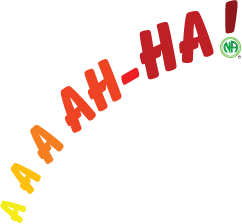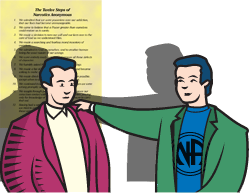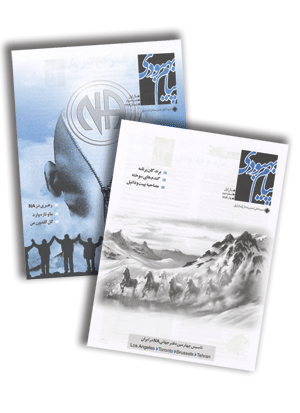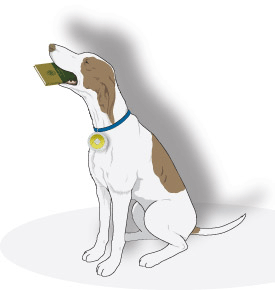Feature
|
No one, regardless of their clean time,
spiritual enlightenment, or personal evolvement likes, to
know that somewhere, someone is saying mean things about
them. |
No, really, just tell me
The other day I made a horrible mistake. I made it
unwittingly and without malicious intent, but I still made
it. I relayed a piece of gossip to a friend, a piece of
gossip that had them as the central figure and held them in
a most unflattering light. My friend, suffering from one of
the most human of weaknesses—curiosity—did what so many of
us have done before when asked the question, “Do you really
want to know?” She lifted her chin and lied, saying “Yes.” I
should have never fallen for it.
The problem is, we feel so compelled to indulge our
curiosity that we will invite in (and by invite I mean hold
open the door, beckon, wave, and smile broadly, all while
straightening the welcome mat with the tip of our shoe) all
manner of mean-spirited, petty jibes. Curiosity is like a
strange tickle, an itching that starts deep in the base of
the mind, beyond fingers’ reach, a hot patch that demands
attention. Like a sneeze building in the nose, all we can
feel is the pressure of not knowing, all we can register is
the un-answer seeking to expand its confines, until we achoo
out the words, “No, really, just tell me.”
And then we know, and there is no undoing that knowledge.
Information cannot be extracted or erased from the
brain—except, of course, for high school math, which I
managed to erase with a concoction of illicit substances
taken over a prolonged period of time. Words, once they have
traveled down the ear canal, do not make a return trip. They
are not touring on holiday visas, with tiny velcroed sandals
on their little serifs. They are emigrants, huddled together
in their masses, striking out for a brave new world. They
move in with the extended family and form little ghettos of
knowledge and knowing.
No one, regardless of their clean time, spiritual
enlightenment, or personal evolvement likes, to know that
somewhere, someone is saying mean things about them. I
believe this; and if I doubted it before, then the
crestfallen look on my friend’s face and the question “Do
you think that, too?” asked several times over the course of
the conversation completely rid me of that doubt.
This is where I found my resolve, in that moment when I saw
the sadness on my friend’s face and heard the hurt in her
voice. This is where I found the internal fortitude and
resolute conviction to no longer act as a conduit, the point
at which I decided that I will never again act as a channel
for gossip. I will become a bricked-in doorway, a vast,
uncrossable moat, a ring of fire, a vigilant sentinel
determined to keep
malicious, prejudicial, unfounded gossip from making it over
the wall. I will do this for those I love—and I will do this
for me, the one I am trying to love. And, in this most
simple act, I will remember that those I cherish are worth
more, that I cherish them for intensely personal reasons
that transcend the silly whisperings of a faceless few, and
I will remember that my hunger for esteem can be fed with
small mouthfuls of esteemable acts. Finally, I will remember
that, if nurtured and kept safe, the love I feel for and
from them can eventually wash away the lingering residue of
the petty, jealous nature of mine that offers them the
information in the first place.
Ngaio C, New South Wales, Australia |
 |
Do you remember when you first “got” the NA
message—when it was finally clear that you had real hope for
recovery? And what about other experiences later in recovery
when the clouds parted and everything seemed to come
together like a bright ray of sunshine in your life? These
are what we call our “ah-ha” moments.
Share your ah-ha moments with us by email at naway@na.org,
by fax at 818.700.0700, attn. NA Way; or by postal mail at
The NA Way Magazine; PO Box 9999; Van Nuys, CA 91409
USA. |
|
A gift to hold onto
My “ah-ha” moment came when I realized that my daily craving
for my drug of choice (or any substitute) was dissipating
and would eventually become nothing more than a memory. The
miracle of the program for me is that, even though my desire
to use was present, I could choose not to pick up. After ten
years of bouncing in and out of NA, I finally came to this
realization. The “ah-ha” really happened for me when the
cravings came back with a vengeance well into my second year
clean, and I realized that the reprieve wasn’t only a gift,
but a gift that I could hold onto. Sometimes we don’t
realize or imagine what is missing until it returns.
Brenda W, Hawaii, USA |
 |
 |
Love, respect, and acceptance
After I received the recovery message from an NA member, I
had hope. I went to my first meeting, and a member told me
that he would love me, respect me, and accept me until I
could do all those things for myself. He touched my soul
because, for a long time, I had not loved, respected, or
accepted myself. The next day, he told me that he had
attended that meeting only to make sure that I was there and
that I was alright.
Juan Carlos R, Santiago, Chile |
Sharing
|
|
Eighty-four days
Editor’s note: Following the formation of the H&I
subcommittee in Iran, Payam Behboodi (the Iranian NA
community’s recovery journal) has been receiving letters
from prisons across the country on a regular basis. The
following letter has a different story. It is from someone
who got to know NA while imprisoned, despite drugs being
widely available in their jails at low prices.

|
My name is Habib and I am an addict. Greetings to
all the addicts at the Central Prison of Qazvin, and
to all NA groups around the world.
I am writing this letter as I pass the final moments
of my life. I am very close to death. I wish to send
a message to all fellow members: I got clean through
a Narcotics Anonymous meeting in jail, and through
attending these meetings, I stopped using drugs. I
have become very close to God, I feel good, and I am
at peace with myself and the world. I have accepted
the will of God.
I’d like to ask you fellows to stay clean and be of
service. Try to help other addicts stay clean
physically, mentally, and spiritually. Please
continue this path to save other addicts. I have
nothing else to say. My name is Habib, and by dawn
my life will end. I will be hanged for the crimes I
committed, but I have been clean for eighty-four
days beside you. I wish success for all addicts …
members and non-members. God bless.
Habib, Qazvin, Iran
|
Payam Behboodi,
the Iranian NA community’s recovery journal
|
 Buster’s home group
Buster’s home group
For
the last few weeks, my home group has had an attendance of
three: myself, another addict, and a dog named Buster.
Buster does not usually share, but he likes to participate
in the group hug and Third Step prayer at the end of the
meeting by barking and jumping on us.
Sometimes the other addict and I discuss whether keeping the
meeting open is worth it, because we don’t seem to be
attracting other addicts in the small town in which we live
(population 5,000). It really doesn’t matter, because we
continue to keep the meeting going, and that’s what counts.
We meet on Tuesday nights at 7:30 pm in a mental health
recreational facility in a town named (you’re not going to
believe this) 100 Mile House. We are pretty flexible with
the length of our meeting; sometimes it’s shorter than an
hour and a half, and sometimes longer. It all depends on
what the need is for that meeting.
As I opened the meeting one night, I wondered if anyone else
would show up. I was prepared to spend the meeting alone.
The other addict in town who regularly attends was out of
town and probably would not be able to make the meeting,
which also meant Buster wouldn’t be there. Another addict
who was in the area for hunting had called to say he would
attend, but I was not counting on him showing up.
I contemplated what step I might read from It Works: How
and Why during the meeting time. What a surprise when
the hunter showed up. We were able to connect right away,
and both of us knew some other NA members in various parts
of BC. And then—lo and behold—a newcomer walked through the
door to attend his first meeting! We finished the readings
and were ready to read Step One from It Works when
the other addict who had been of town for the day showed up.
What a great meeting it was. For the first half of the
meeting we read Step One; then, after a break, we all
shared. The meeting lasted over two hours, and for me, it
was like a convention.
The only one missing that night was Buster, who didn’t come
with his human. I actually think that might be the only time
Buster has missed our home group meeting. Oh well; as the
meeting closed, I hoped to myself that he would stay clean
until the next meeting.
He did.
Dave S, British Columbia, Canada
Service learning
I just read the latest NA Way Magazine and found
myself thinking of all the hard work that occurs each day to
create the magazine. As I thought about this, I was reminded
of the service each member can bring to our fellowship and
how much we gain individually and as a fellowship through
service work.
There is a
place for
every
member of
NA to be of service... |
I am of service to a regional convention, and the
experience makes me grateful I took the suggestion
to participate in my recovery in this way. I have
learned to accept that group conscience—not my own
idea of what is right or wrong—decides every issue.
I’ve learned what it means to follow through by
making the commitment to show up at every meeting on
time and stay until the meeting is over. The
open-mindedness required to serve has taught me to
listen before making a comment, and I’ve become more
patient with myself by practicing patience with
others. I’ve become more aware of all the hard work
others put into their service commitments just by
being responsible for the commitments I’ve made.
Tolerating change and new ideas has helped me grow
into a person I hardly recognize, and the
willingness to continue to commit myself every day
to this new way of life has helped me to stay
focused on my recovery. |
I
would have missed out on so much if I had chosen not to take
that early suggestion to be of service.
There is a place for every member of NA to be of service,
and the growth experienced in doing so is well worth the
time and effort required.
Lorraine L, California, USA |
|
Complacency
According to a dictionary, complacency is a state of
contentment or self-satisfaction coupled with lack of
awareness of actual dangers or deficiencies.
According to the Basic Text, “Complacency is the enemy of
members with substantial clean time. If we remain complacent
for long, the recovery process ceases.… Denial returns,
along with obsession and compulsion. Guilt, remorse, fear,
and pride may become unbearable. Soon we reach a place where
our backs are against the wall.” (p. 80)
We become too busy
for our recovery—until
we slowly notice our
lives have become
unmanageable again.
Until recently, I had no idea what this word meant,
nor did I realize how something this simple could
affect me in my everyday life and recovery. I was
feeling “blah” in my recovery, and meetings no
longer held much meaning for me. Daily routines
became boring. I dreaded school, work, and even
getting out of bed. My drug-court commitments were
only something I had to do to stay out of jail. I
was burnt out on college, something I had worked
extremely hard to get going. My life seemed dull and
boring, even though my schedule was packed with
activities. I felt frazzled and forgot important
things—like how many meetings I attended weekly,
calling my sponsor, when I went to court last, and
even my son’s dental appointments.
I finally learned the word “complacency” from other
addicts. They shared that complacency can be a
danger zone, and that it is something many of us
experience. We attend fewer meetings, stop working
steps, and often alienate or isolate ourselves.
Sometimes complacency sets in when we are
approaching clean dates. After putting some clean
time together, some of us get so wrapped up in life
that we forget our most important priority.
It happens gradually. We get jobs, start school, and reunite
with lost family. The dog gets sick, or other things in life
get in the way, and we go to meetings less and less. We
notice we haven’t called our sponsor, shared at a meeting,
or even attended any recovery events in quite a while.
We become too busy for our recovery—until we slowly notice
our lives have become unmanageable again. The
unmanageability slowly grips our lives, and then we find
ourselves struggling to figure out what is wrong.
|
 |
The answer is right in front of us. We became complacent in
our recovery and no longer went the extra mile for what we
wanted so desperately in the beginning. It is at this point
that we take notice and open our eyes to see that, without
constant participation in our recovery, we will spiral out
of control and end up where we started—or even worse.
I think I am starting to see the real meaning of this
powerful word, “complacency,” and just how it has been
affecting my life these days. Today I will be aware of
complacency in my recovery and every part of my life, and
recognize the signs before my life becomes unmanageable.
Shannon S, Washington, USA |
|
|
The faces of recovery
Who do we see when we look into the faces of fellow members
at a meeting? Do we know what hopes and struggles they
contemplate? Maybe it’s something like this:
 |
I’m scared of what might happen next. |
 |
I’m so confused, and I don’t know what to do. |
 |
Would ya, could ya, will ya, can ya help me?! |
 |
Can I trust you enough to show me “the NA way”? |
 |
I know you think I’m paying attention to you, but my
mind is racing so fast around something else that
I’m really not even listening to what you have to
say. |
 |
I am telling you the honest truth. Not. |
 |
Are you being honest with me? |
 |
What am I supposed to do now? |
 |
I’m trying my best to hide the pain I’m feeling. |
 |
Do you really “believe”? |
 |
How did I ever get myself in this deep? |
 |
How can you be so screwed up with all that clean
time?! |
 |
I really do want to know exactly what it takes to
get better, but don’t tell me I’m actually going to
have to do something! |
 |
What was it like for you? |
 |
Are you a person I can follow? |
Warren L, Florida, USA




What do you see when you look around at the faces in
your meetings? Do you even look at others—or are you focused
on the clock or your cell phone screen as you send and
receive text messages? Some say they spent much of their
early recovery staring down at the shoes in meetings, mainly
critiquing them and their wearers. Gradually, as they became
more comfortable, they looked up at the faces of the people
wearing those shoes—and found connections that helped them
in their recovery.
We come to NA with different backgrounds, fears, and
expectations, but we all share the experience of our disease
and the hope of our recovery. Who were you sitting next to
at the last meeting you attended? Is that person finding
what he or she needs in NA? And when you look around, who do
you notice is missing from your meetings? Do you see
newcomers who have found NA as easily accessible and
attractive? Do you see members with longer clean time still
present and actively sharing their experience in your
meetings? Or are newcomers and oldtimers absent? And who in
your community has not found NA at all?
What stories do you see when you look into the faces of your
fellow members at NA meetings? Write to The NA Way
Magazine and tell us about the faces of recovery. |
 |
Back to top |

